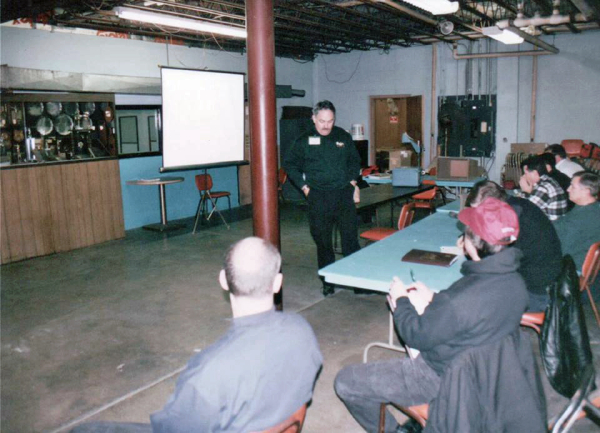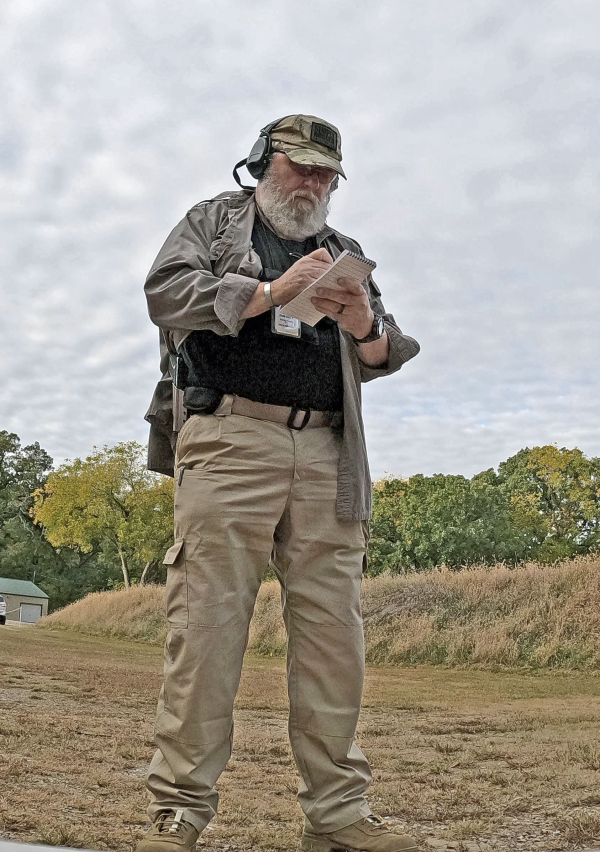Nearly all of us in the business are willing to chant “get training” over and over again, but few in the audience take the hint. Like any other verbal shorthand, “get training” has a solid basis, but not everyone can – let alone will – seek a foundation training class.
I get it. While I have lots of time on the planet, I recall happily leaving school – never to “take notes” again, not being told what to read and what to think.

Whether it’s classroom (above, Buffalo NY) or on the range (Phoenix, AZ) – or both – good training is as critical as it is rare.
Then I got to the Army. It was “back to school,” in Basic first, then AIT. I did well enough that my Advanced Individual Training was followed by a service school. While learning occurred at each stage, service school had the greatest impact.
After leaving service, it took only a few years before I was back in a classroom. First it was college, then basic law enforcement academy, followed by some training seminars. From that basis, I never looked back, later becoming a trainer, then instructor-trainer, adjunct faculty at a university – and don’t forget the annual in-service requirement.
The problem isn’t just finding a class – there are more now than ever – but it's still a matter of too few quality instructors, with too few facilities (including ranges) against too many potential trainees – even if those potential trainees actually stepped forward.
Stephen Wenger, in his news digest, recently posted a piece about training from which he explained what one needs to take to training in a firearms class.
A good many trainers will provide a “requirements for class” list to help people equip themselves for success in learning.

The job’s not complete until the paperwork is done; taking notes in class and on the range aids retention. Type them up later the same day or soon thereafter; that aids recall of information missed in the notes.
Among other things, Stephen brought up taking notes. As he neared the end of his time as a trainer, he provided notepads to students, encouraging them to take notes after every drill. This gave them a reference from which to practice after the class was over.
He also said that he received information that information retention is enhanced by hand-writing notes – more so than typing on a keyboard.
That is my experience. I’ve tried to keyboard notes. When I’m in the mode of composition, the keyboard is king. When taking notes, there are gaping holes in recall – for me.
It reminds me of the real first rule of police work: always have something to write with and something to write on. When I type those handwritten notes after a class, I find that the act of typing from notes jogs my memory, bringing back information I’d failed to write down.
While there are equipment issues – having a spare analog gun (saved me in one class), extra ammo, water, “lead removal” wipes, “snivel gear,” more magazines/speed loaders than required, etc. – it’s recall and retention that are critical issues. Having the right gear – and enough of it – as well as ensuring your firearms/magazines are in proper working order, helps facilitate learning. Instead of trying to keep up when you have a malfunctioning firearm, you can be ‘drinking from the firehose.’
Some people like to use video recording to take notes during classes; some trainers won’t allow it. It seems that people are more likely to speak freely if they know it’s not recorded and posted on the internet for posterity.
Limiting video recording to an instructor demo is a good middle of the road solution. Proper use of video enhances retention of information.
If you’re new to the world of defense firearms, education and training is important. Good luck finding an instructor and a facility.
And I hope you get a good instructor.
— Rich Grassi